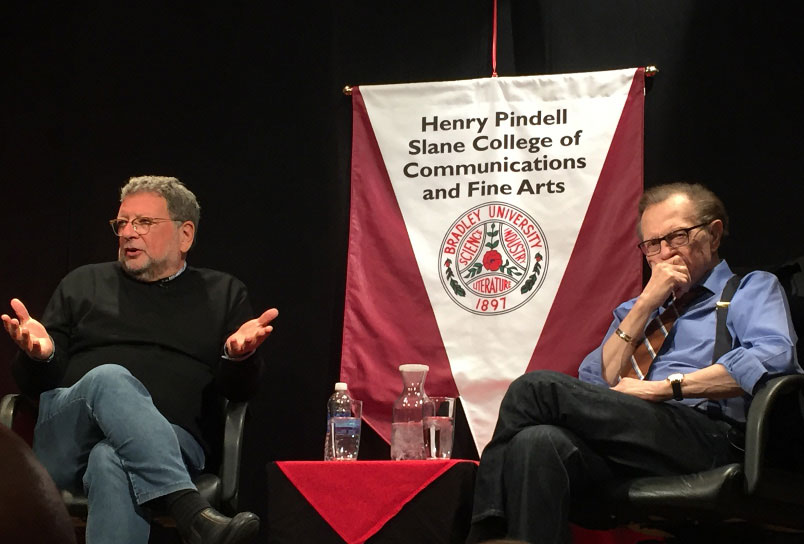
Larry King, iconic broadcaster and Bradley honorary degree holder, died Jan. 23 and left an indelible mark on the broadcast industry. However, his legacy at Bradley University is one that will be especially unforgettable.
His relationship with Bradley started through his friendship with 1971 alumnus Charley Steiner, the current Los Angeles Dodgers play-by-play announcer. Through that friendship, King became a guest at the first Steiner Symposium in 2015 and returned again in 2017. Most notably that year, King pledged to donate $1 million to help students majoring in communications who need financial assistance. However, Bradley has not yet received the donation.
Joshua Dickhaus, director of the Charley Steiner School of Sports Communication, worked with him during the symposium and described him as personable.
“You could see how easily interviewing came to him and how easily he knew which questions to ask and which questions would get the best response,” Dickhaus said.
Paul Gullifor, professor of communication and former chair of the department of communication, said he was struck by how humble King was, knowing that he had interviewed some of the most important and influential leaders in world history.
“We probably had asked him questions that he had been asked a million times, but he patiently answered them,” Gullifor said. “He was very cordial, a very pleasant person and incredibly interesting as you can imagine by the stories he could tell. He was the kind of guy you could listen to all day—just a really really kind, down to earth human being.”
King’s time spent with students and sharing lessons with them really stood out, according to Gullifor.
“He had an instant rapport with them [students],” Gullifor said. “He’s got a wisdom that he imparted on the students; he had great advice for them, very patient in answering their questions. I think he really enjoyed interaction with the students and I’m pretty sure students really enjoyed having him.”
Dickhaus recalled a relaxing dinner at Jim’s Steakhouse after the third annual Steiner Symposium, where the two had an intimate conversation about each other’s interests, history and current projects.
“That was the thing I’ll remember—having food and a glass of wine and talking to him about his career,” Dickhaus said. “That to me was him: very engaging, very personable and really very kind to me. It’s one thing for the way a person may act in front of a group of people and they could be totally different in private. I found him enjoyable to be around.”
For Gullifor, a memorable experience was his interview with Charley Steiner. He said it was interesting to see King in the role of the interviewee rather than the interviewer and that he was equally comfortable.
“He didn’t take over the event and started interviewing Charley Steiner—he clearly knew what his role was,” Gullifor said. “Again, I think it speaks to his humility, but he came across as somebody that you could sit down and have a cup of coffee with and just have a talk … You forgot very quickly that you were in the presence of someone who had done everything here. He was just fascinating, in that regard.”

